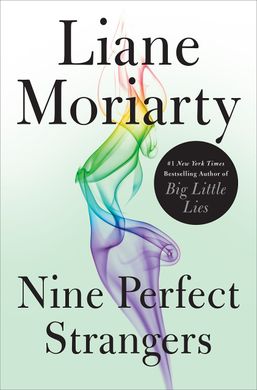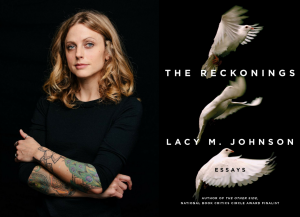“Nine Perfect Strangers” satisfies, but doesn’t stun

Stacy Alesi
Despite its shortage of imagination relative to her other books, Liane Moriarty’s “Nine Perfect Strangers” nevertheless manages an eventful plot with instances of distinctive characterization.
April 5, 2019
It might not be fair to compare Liane Moriarty’s latest novel to her past bestsellers, but “Nine Perfect Strangers” does not live up to expectations. Despite this, Moriarty manages to shape an enticing story and capture stirring ideas in her words.
Moriarty typically shines when it comes to molding bizarre, interesting characters while maintaining a sense of grounded reality. Her bestsellers, which include “The Husband’s Secret” and “Big Little Lies,” are flooded with electric suspense and dark humor; her books have been described by USA Today as “drinking a pink cosmo laced with arsenic” — viciously, gleefully venomous.
“Nine Perfect Strangers” follows a relatively simple plot, complicated by a multitude of characters. As the title suggests, nine strangers arrive at a health resort, Tranquillum House, each expecting to be changed or enlightened by the resort’s “unconventional” treatment. Every stranger hides a tragic (or pathetic) past, and each has hopes to be changed into a better — thinner, happier, calmer — person.
And of course, as with all of Moriarty’s books, a delightful thread of underlying ominousness is slowly, but surely, revealed about the health resort’s bizarre director, and equally questionable treatment. And slow it is, for Moriarty begins the story with about 29 long chapters of character-building before the real plot twist even occurs — and when it does, it slips too suddenly into horror, as if Moriarty were so caught up in her characters she forgot her central plot and twisted the story at the last minute.
During the entire first half of the book, Tranquillum House seems like any old health resort, with massages, spas, meditation and fasting. A considerable amount of time is spent describing rather unnecessary details, such as the resort’s rooms and unsurprising practices (“There were multiple tall vases stuffed with sprigs of lavender, the soft furnishings and cushions were all in various shades of lavender, and just in case you’d missed the point, pictures of lavender adorned the lavender-colored walls”); it almost seems to be irrelevant, and Moriarty’s usually slick humor comes off as forced. We don’t want to read about a normal, mundane health resort; we want Moriarty’s signature, snappy prose, with that underlying current of something sinister. But it takes too long.
And it’s no wonder Moriarty had to spend so many pages on character development — throughout the course of the book, she jumps between the perspectives of 12 people (all nine “strangers,” plus three other characters), which has the potential to get messy, but she pulls it off precariously.
The main character, Frances Welty, is a burnt-out romance author despairing from her latest novel rejection and a harsh review of one of her books. She is almost cringeworthily pathetic, but only because Moriarty shapes her to be so relatable in her overdramatic emotions and wonderfully barbed observations. When Frances meets two other strangers, Ben and Jessica — a couple who won the lottery and is seeking marriage counseling — she latches on immediately, with, in Moriarty-style, a sense of dry, relatable levity: “They would see her as old and eccentric and maybe even annoying, but it didn’t matter how they saw her, as long as they saw her.”
These little snippets, in which Moriarty manages to convey simple ideas that are not easy to put into words, are what make this book worth reading. Such is when Frances reads the dreaded book review: “She was fine! Can’t please everyone. Comes with the territory. And then she felt it. It was like when you burn yourself on a hot plate and at first you think, ‘Huh, that should have hurt more,’ and then it does hurt more, and then all of a sudden it hurts like hell.”
In a subtle way, Moriarty acknowledges and perhaps even fires back at those readers who feel the first half of the book progresses too slowly. Through the eyes of Frances Welty, the romance novelist, Moriarty writes: “It seemed to Frances that readers once had more patience, they were content for the story to take its time, for an occasional chapter to meander pleasurably through a beautiful landscape without anything much happening, expect perhaps the exchange of some meaningful eye contact.”
By exploring the multitude of characters’ problems, Moriarty dissects difficult topics and conveys her own nuances in thought. Carmel, one of the nine strangers, sees herself as a typical “overweight stressed-out suburban mum.” Through the “transformation” of Carmel, Moriarty follows Carmel’s journey to acceptance and emphasizes, powerfully and wonderfully, the foolishness of this mindset: “Women and their bodies! The most abusive and toxic of relationships … You never changed your appearance for men. You changed it for other women. Because they were the ones carefully tracking each others weight and skin tone along with their own.”
“Nine Perfect Strangers” proves that Moriarty, even when she’s not at her best, can still produce a sound novel. While some parts may be a struggle to read, Moriarty’s writing is irresistible and captivating nonetheless. “Nine Perfect Strangers” was released September 2018, and it can be found on Amazon for $16.06 and at Barnes and Noble for $16.68.




